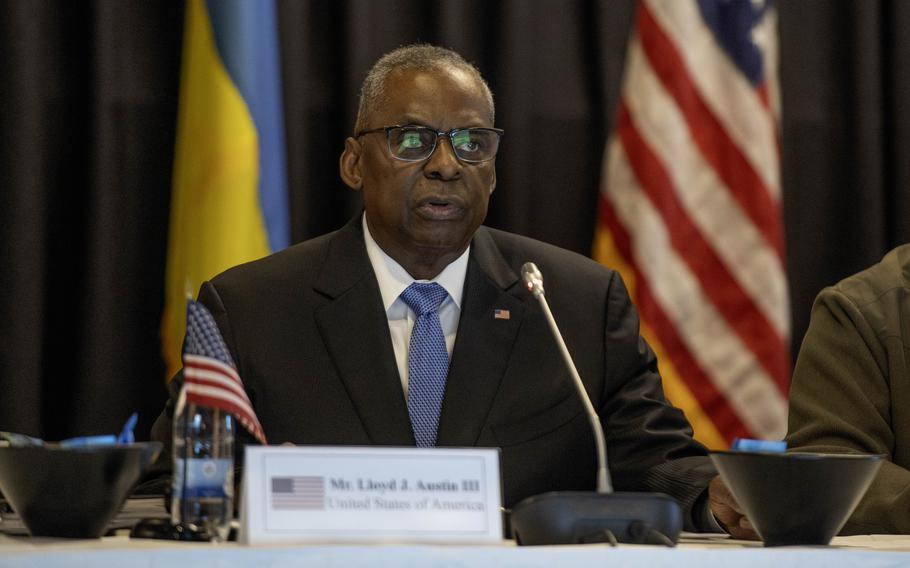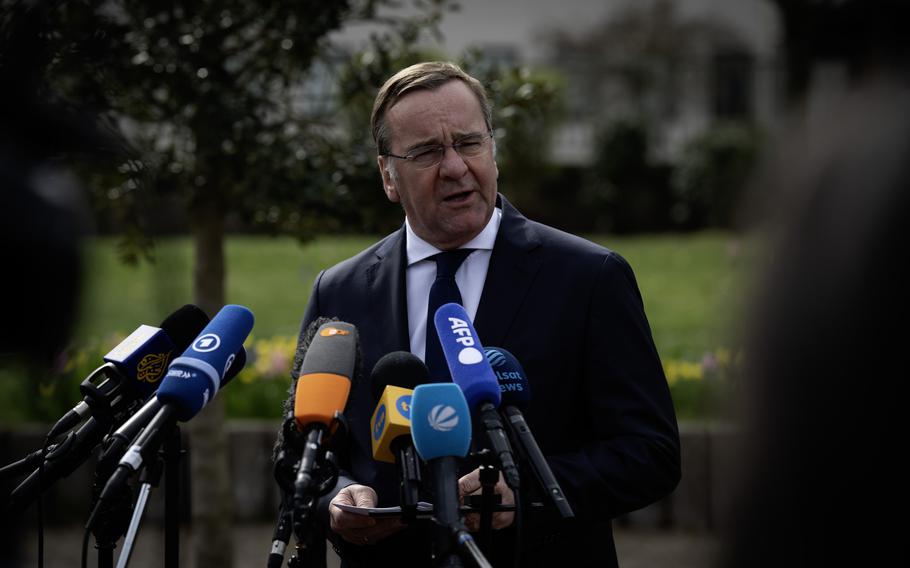
Defense Secretary Lloyd Austin gives opening remarks next to his Ukrainian counterpart, Rustem Umerov, during the Ukraine Defense Contact Group meetings at Ramstein Air Base, Germany, Tuesday, March 19, 2024. (Alexander Riedel/Stars and Stripes)
RAMSTEIN AIR BASE, Germany — A new military aid package from the United States worth $300 million will support Ukraine’s pressing needs for air defense, artillery and anti-tank capabilities, Defense Secretary Lloyd Austin told European allies Tuesday.
Other immediate assistance will come from the Czech Republic, which recently procured 800,000 “urgently needed” artillery shells, Austin said at the outset of the Ukraine Defense Contact Group meeting. Germany, France, Denmark and newest NATO member Sweden also have pledged new military aid packages, he said.
In Germany’s case, Defense Minister Boris Pistorius said Berlin has committed to a new aid package for Ukraine worth nearly $540 million. The package includes 10,000 rounds of ammunition from German military stocks, with delivery expected “nearly immediately,” Pistorius said.
Another 180,000 rounds of 155-millimeter ammunition from Czech supplies will be phased in over the summer, he said.

German Defense Minister Boris Pistorius speaks to members of the press during the Ukraine Defense Contact Group meetings at Ramstein Air Base, Germany, Tuesday, March 19, 2024. (Alexander Riedel/Stars and Stripes)
Austin said the group’s roughly 50 countries continue “to dig deeper to get vital security assistance to Ukraine.”
Austin addressed defense leaders and military officials at the Ramstein Officers Club as part of his first trip abroad since he was hospitalized Jan. 1 due to complications from surgery to treat prostate cancer.
By Austin’s side for the first time at the periodic Ramstein meeting was Air Force Gen. Charles “CQ” Brown, who replaced Gen. Mark Milley in September as the chairman of the Joint Chiefs of Staff.
The talks come as support for Ukraine in the U.S. House of Representatives is wavering amid domestic concerns and a shift in foreign policy focus to the war in Gaza.
But Austin stressed the urgency of helping Ukraine as the war with Russia enters its third year.
“Ukraine’s survival is on the line,” he said. “And all of our security is on the line.”
Ukrainian President Volodymyr Zelenskyy has said Russian President Vladimir Putin is preparing a new offensive against Ukraine starting in late May or summer.
So far, Russia’s gains on the battlefield have been incremental, Austin said. And those gains have come at significant costs in personnel and equipment for the Russians, he said.
Still, allied officials have said Russia is now on a wartime economy footing that is churning out ammunition and equipment at a rapid pace to replenish its stockpiles. Ukraine’s ability to fend off a Russian offensive in the spring likely will hinge on whether the West can get enough ammunition into the country fast enough.
“They need support in order to be able to continue (defend their territory),” Austin said. “And, of course, that’s where the supplemental (U.S. funding) comes in, and we certainly would hope that we would see the supplemental get passed.”
Meanwhile, the White House has scrambled to free up funds as the House stalls on approving further military aid to Kyiv.
The U.S. found $300 million in unanticipated savings from Pentagon contracts to provide Ukraine military assistance, President Joe Biden announced last week.
The package, to be used for artillery rounds and munitions for High Mobility Artillery Rocket Systems, likely is a one-time situation, U.S. officials said.
House Speaker Rep. Mike Johnson so far has refused to call a vote on a bill to provide $60 billion in aid for Ukraine.
On Tuesday, Austin said a newly formed “capability coalition leadership group” will help address Ukraine’s highest priority needs.
Austin thanked Denmark, Estonia, France, Germany, Iceland, Italy, Latvia, Lithuania, Luxembourg, the Netherlands, Norway, Poland and the United Kingdom for their roles in leading the group.
“We’re coordinating on cross-cutting issues such as drones, sustainment, command and control … and galvanizing our defense industrial bases,” Austin said during opening remarks Tuesday.
“Let’s not kid ourselves,” Austin added. “Putin will not stop at Ukraine.”
Stars and Stripes reporters John Vandiver and Alexander Riedel contributed to this report.